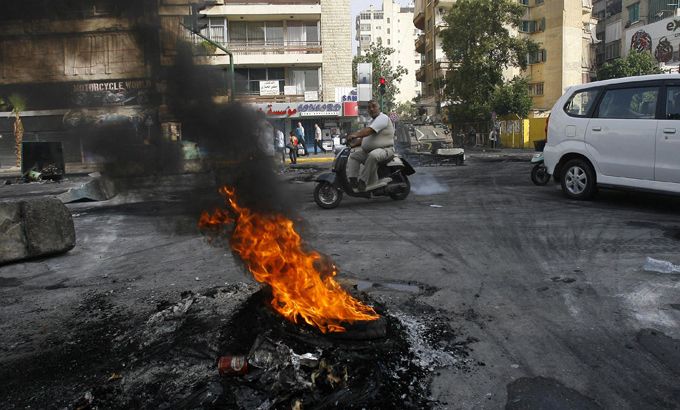Lebanon tense after bomb kills security chief
Prime minister says he will remain in his post, as protests over anti-Syrian official’s killing erupt in several cities.

Protests have erupted in several Lebanese cities a day after eight people, including Wissam al-Hassan, a senior security official opposed to the Syrian regime, were killed in a car bombing in Beirut.
Demonstrators and gunmen blocked roads with burning tyres in the capital on Saturday, while soldiers opened fire on a group who took over a road in the Bekaa valley, wounding two people, witnesses said.
Much of Lebanon is divided between those that support the Syrian President Bashar al-Assad and those that back the rebels seeking to topple him in the country’s bloody 19-month conflict.
Friday’s bombing added to fears of renewed sectarian violence in the country, still scarred from a long civil war.
The opposition March 14 alliance called on Lebanon’s government to resign over the attack, which it blamed on the Syrian regime.
After an emergency cabinet meeting, Prime Minister Najib Mikati said he had offered his resignation but that President Michel Suleiman has asked him to stay on for a “period of time”.
“I assured the president of the republic that I was not attached to the post as head of the government,” Mikati told a news conference.
“He asked that I stay in place because it is not a personal issue but one of the national interest.”
Mikati said the blast was linked to the slain intelligence chief’s recent case, in which he exposed an alleged plot by Syria to sow chaos in Lebanon.
Day of mourning
Hassan, intelligence chief of the Internal Security Forces (ISF), headed an investigation over the summer that led to the arrest of Michel Samaha, a former information minister and ally of Assad, accused of trying to help smuggle explosives into Lebanon.
| Hoda Abdel-Hamid reports from Tripoli |
Hassan had also led an investigation that implicated Syria and Hezbollah in the assassination of former prime minister Rafik al-Hariri.
Saturday was declared a day of mourning and Hassan was to be buried on Sunday alongside Hariri, murdered in a car bombing seven years ago.
The anti-Syrian opposition, led by Hariri’s son Saad, called for a massive turnout for the funeral, which will be held after Muslim prayers at the al-Amine Mosque in the capital’s centre.
Friday’s blast, which wounded at least 80 people, drew condemnation from abroad, with US Secretary of State Hillary Clinton calling it a “dangerous sign that there are those who continue to seek to undermine Lebanon’s stability”.
Omran al-Zohbi, the Syrian information minister, condemned what he called a “terrorist, cowardly” attack. Such incidents were “unjustifiable wherever they occur,” he said.
Both Saad al-Hariri and Walid Jumblatt, the influential Druze leader, accused the Syrian president of being behind the bombing.
“We accuse Bashar al-Assad of the assassination of Wissam al-Hassan, the guarantor of the security of the Lebanese,” said Hariri.
Tripoli violence
Meanwhile, soldiers and police guarded street corners in Beirut’s Ashrafiyeh area on Saturday, the mainly Christian district where the bomb exploded during rush hour, and at Martyrs’ Square in the centre.
In the northern city of Tripoli, where Syria-related tensions are running high, one person was killed on Friday night after clashes erupted between the rival districts of Jabal Mohsen and Bab al-Tabbaneh.
Jabal Mohsen is populated by mostly Alawites supportive of Assad, while Bab al-Tabbaneh is a Sunni area mainly sympathising with the opposition.
Al Jazeera’s Hoda Abdel-Hamid, reporting from Tripoli, said there had been sporadic fighting overnight and that gunfire had been heard in the city on Saturday morning after armed groups urged shopkeepers to keep stores shut.
“People on the street tell us that armed men on motorcycles were shooting in the air, warning shopowners that they must stay shut today,” she said.
The main highway from Tripoli to the Syrian border was shut down, with protesters burning tyres in the Akkar area.
Major-General Ashraf Rifi, the head of Lebanon’s Internal Security Forces, described Hassan’s death as a “huge blow” and warned that further attacks were likely.
“We’ve lost a central security pillar,” he told Future Television. “Without a doubt, we have more sacrifices coming in the future. We know that, but we will not be broken.”